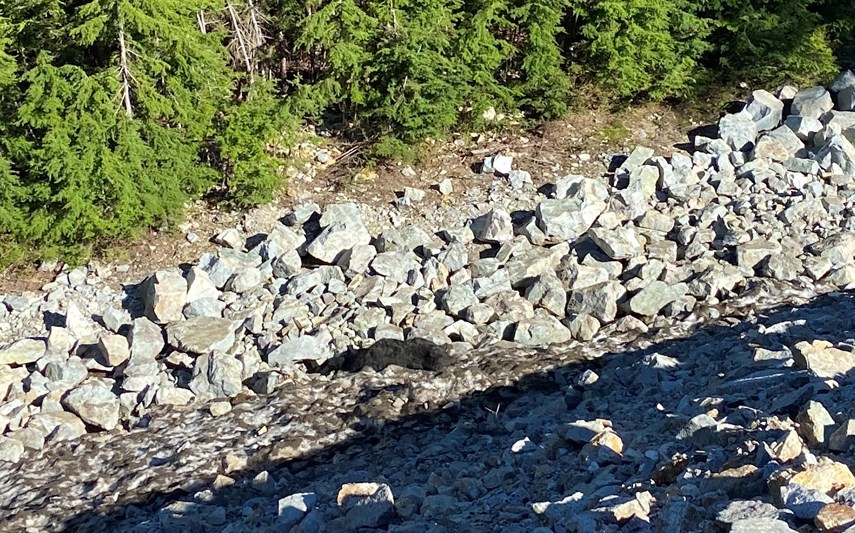One bear has been killed and conservation officers are warning the public after two incidents of bruins accessing people’s homes on the North Shore, on Friday and Saturday.
“It was an absolutely terrible weekend,” said Luci Cadman, executive director of the North Shore Black Bear Society. “Entering a confined space is not tolerated by the Conservation Officer Service.”
In the “heart of Deep Cove” Saturday, a large bear that was not previously known to the society’s volunteers or the COS, pushed its way through a screen door to get food.
“We responded. The bear was still on scene, not fazed by anyone,” said conservation officer Simon Gravel. “The bear was captured and euthanized due to the fact he entered that house.”
It was only after the incident that conservation officers and the Black Bear Society learned that it had been regularly accessing garbage and decks on the street.
“It's always disappointing for us to show up in an area with a bear and learn the level of conflict for the first time,” Gravel said. “It's unfortunate because those situations are preventable. … There's a level of complacency there.”
On that, Cadman and Gravel agreed.
“That's why I encourage people to let us know – so we can do proactive education,” she said. “We don’t want them coming into our homes. That doesn’t turn out well for the bear, certainly.”
On Friday evening, residents in West Vancouver’s Westmount neighbourhood, just south of Highway 1, called for help after a small sow came in through an open door to access food. The home’s residents chased the bear away before police or conservation officers arrived.
Cadman said the bear is known in the area and she has two cubs about five months old, “not much bigger than cats, right now.”
Because of the heat wave, Gravel said they won’t attempt trapping the bear anytime soon and they will reassess what to do about the bear, based on its activity over the next few days.
“We had to remove traps due to the heat. Obviously, it would not be humane to have a bear even 10 minutes in a culvert trap,” he said.
Gravel added that entering a home is a learned behaviour, which is a very concerning sign.
Cadman, however, said she believes the bear has learned from the experience to stay out of buildings. The Black Bear Society is aware of cases of bears over the years who did manage to get inside someone’s home but then not be reported on the property again that season, she added.
“We don’t, of course, support killing bears for making mistakes like this,” she said.
Gravel said it always seems to be during a heat wave when bears are lured into easily accessible homes.
“People obviously are more preoccupied about staying cool than [attracting] black bears in their backyard,” he said. “If you do need to ventilate your house in bear country, you need to monitor it at all times because it happens very quickly. It's easy for a bear to enter a house and grab a loaf of bread.”
Meanwhile, another bear may be posing a risk to the public despite being dead for more than a week.
The bear was struck and killed by a driver on Highway 1 near Cypress Bowl Road on June 18. Maintenance crews moved the carcass to its current location down a cliff near one of the Cypress Mountain overflow parking lots, which is not ideal because humans and animals are likely to come across it, Cadman said.
Cadman said she’s heard from several people quite distressed by the sight of the decaying bear, but even more worrying is the potential for another bear or cougar to be drawn in by the smell and put into conflict with people nearby.
“It's an opportunity for a few different things to go wrong,” she said.
Anyone who encounters an animal carcass of any substantial size should treat it as though it’s another predator’s next meal, Cadman said.
“Please give it lots of space. You need to calmly but very immediately leave the area. It could be that another animal will feel the need to defend that food source that they’ve claimed, and it is a potential safety risk,” she said.
Cadman said she has since taken the matter up with highway maintenance contractors and asked them to dispose of animal carcasses in a safer manner.
The volume of bear reports has been going down lately, which Cadman hopes is a sign that their education efforts are having an effect. Problems that do arise typically involve garbage and bird feeders, although it won’t be long before fruit trees become an issue.
It is mating season and so male bears are making their way down to lower elevations, she added.


